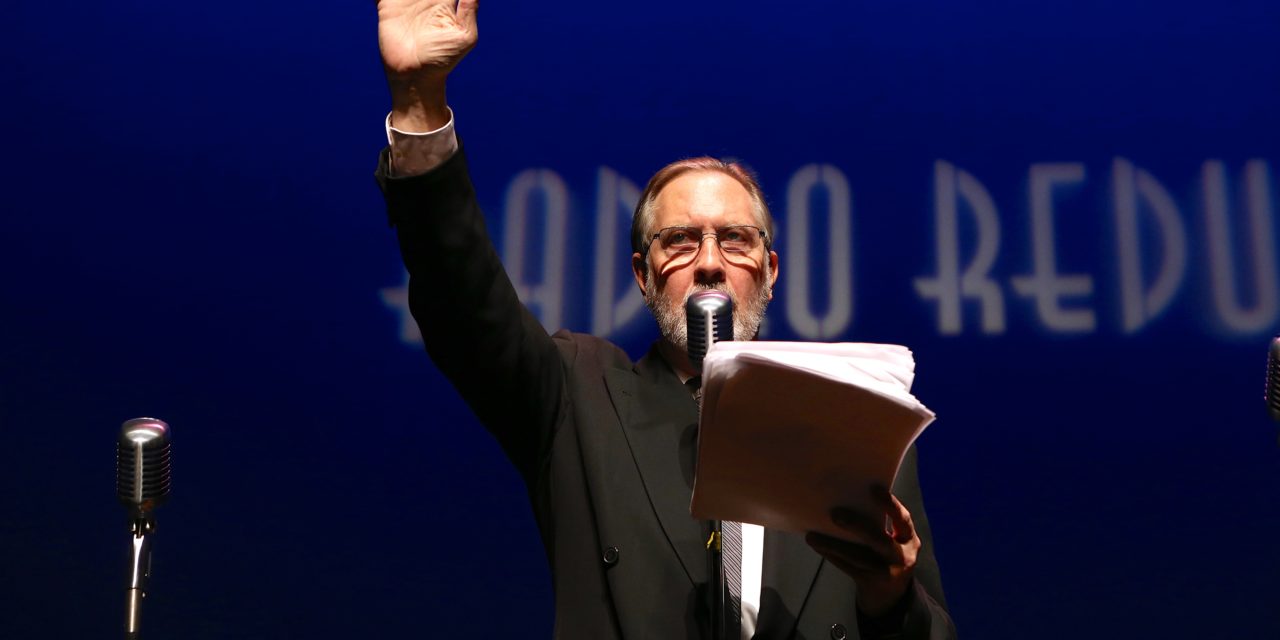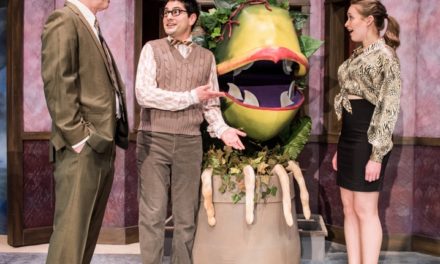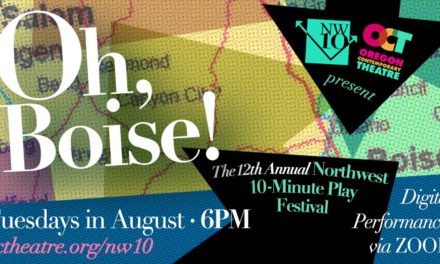(Above: Actor Steve Wehmeier plays Klaatu, a visitor from outer space who comes to warn earthlings to mend their warlike ways or face dire consequences, in Radio Redux’s November show, The Day the Earth Stood Still; photo by Paul Carter)
By Randi Bjornstad
Radio Redux continues its retrospective of favorite shows from the past 10 years with November’s recreation of the radio classic, The Day the Earth Stood Still.
The film with the cautionary message was released originally during the ramping up of the Cold War, “as a powerful indictment of atomic energy that’s as relevant today as it was when it first appeared in 1951,” and its warning “still gives you a lot to think about,” Radio Redux producer-director Fred Crafts said.
A 1940 short story called Farewell to the Master, by Henry Bates, provided the basis for the movie, in which Klaatu, a visitor from outer space, arrives on Earth to warn people that they must renounce their warlike ways and live peacefully, or face the wrath of — and annihilation by — the rest of the universe.
In the movie, Michael Rennie played Klaatu — who took the name Mr. Carpenter during his earthly stay — with Patricia Neal as Helen Benson, a woman who befriended him, and child actor Billy Gray as her son, Bobby Benson. Sam Jaffe and Hugh Marlowe also played lead roles in the film.
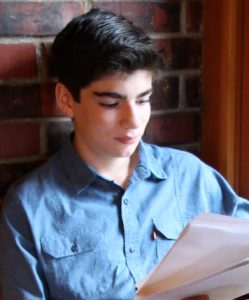
Ben Blonigen studies his script at home in preparation for his first role with Radio Redux, as Bobby Benson in The Day the Earth Stood Still; photo by Randi Bjornstad
In the Radio Redux production, veteran actor Steve Wehmeier takes the role of Klaatu/Carpenter, with Rebecca Nachison as Helen Benson.
Radio Redux newcomer Ben Blonigen, a 14-year-old eighth grader at O’Hara Catholic School in Eugene, plays Bobby Benson.
Other primary roles — with actors often playing multiple parts — are filled by Achilles Massahos, Bill Barrett, Ken Hof, Judi Weinkauf, Scott Barkhurst, Don Aday and Al Villanueva.
The story aired first as a radio play on Jan. 4, 1954, produced by the Lux Radio Theatre on the CBS Radio Network; that it the version that Radio Redux recreates. Later, it also was broadcast by the Hollywood Radio Theatre on the Armed Forces Radio Service.
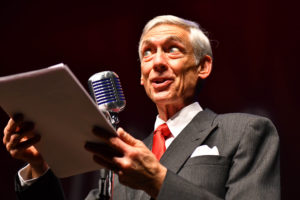
Scott Barkhurst is one of several actors who play multiple parts in Radio Redux productions; photo by Paul Carter
While not as terror-raising as the 1938 Orson Welles production on radio of The War of the Worlds, the American Film Institute still ranks
The Day the Earth Stood Still at No. 5 on its Top 10 Sci-Fi list and among the top 50 of most inspiring American-made movies.
The story also includes one of the most famous and enduring lines of all time, “Klaatu barada nikto,” the meaning of which has been the source of much speculation ever since but never determined.
The plot
Residents on Earth are understandably frightened (as well as amazed) when a sophisticated spaceship suddenly lands in Washington, D.C., carrying the space being Klaatu and an 8-foot-tall robot called Gort.
The Army quickly surrounds the craft, and Klaatu emerges, saying he comes in peace. Nonetheless, when he opens up a device he is carrying, he is shot by a soldier, and Gort comes out and disintegrates the Army’s weapons. Klaatu explains that the device was intended as a gift for the President of the United States that would have allowed him to study life on other planets.
Klaatu is taken to the hospital for surgery, but afterward he uses a salve that he has with him, and his wounds are instantly healed. He then tells one of the President’s men that he has a message which must be delivered to all leaders in the world at once, but he is told that in the current global political climate it is not possible and says that Klaatu may not move freely throughout the population.
Klaatu escapes, cadges a suit from a dry cleaners, and adopts the name on the tag, which is Mr. Carpenter. Using that alias, he rents a room in the boarding house where Helen Benson and her son, Bobby, live.
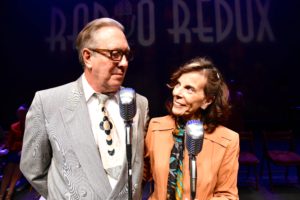
In Radio Redux’s version of The Day the Earth Stood Still, Rebecca Nachison takes the role of Helen Benson opposite Steve Wehmeier’s Klaatu; photo by Scott Kelley
He becomes friendly with the the mother and son and the mother’s boyfriend, Tom, and he begins to babysit the boy when the couple are out.
One day, Bobby takes Klaatu on a tour of Washington, D.C., including a visit to his father’s grave in Arlington National Cemetery, and the Lincoln Memorial. Klaatu asks Bobby who the greatest living person is, and Bobby suggests a professor named Barnhardt.
Klaatu makes contact with the professor and tells him that beings on other planets are concerned because earthlings have begun competing to develop atomic weapons and that if this arms race is not stopped, the rest of the universe will eliminate Earth. Barnhardt says he will convene a gathering of scientists at the spaceship and suggests that Klaatu demonstrate the kind of power he possesses to persuade them to act.
In the meantime, Bobby follows Klaatu to the spaceship one night and sees Gort make two of the Army guards unconscious so that Klaatu can enter. Bobby tells Helen and Tom what he saw, and they do not believe him until one day Klaatu and Helen are in an elevator and he stops it and all other electricity for 30 minutes except for hospitals and airplanes in flight, to prove his power. He then tells Helen his true identity and asks for her help.
The two then head for Professor Barnhardt’s home, and on the way Klaatu tells her that if anything happens to him, she must go to Gort and say, Klaatu barada nikto.
They have been followed, and their taxi is hemmed in. Klaatu jumps out and tries to escape, but he is shot and killed. Helen gets away and goes to the spaceship, where she gives Gort the message. The robot immediately leaves, finds Klaatu’s body and carries it back to the spaceship. He brings Klaatu back to life but tells Helen that it is only temporary.
Barnhardt has brought the world’s scientists together and they gather at the spaceship. Klaatu tells them that Gort and others like him have been created by other interplanetary beings to maintain peace and quell aggression, and that if the Earth’s inhabitants refuse to pursue peace, they will be destroyed and that the interplanetary organization awaits Earth’s decision. Then he and Gort re-enter the spaceship and leave.
The Day the Earth Stood Still
When: 7:30 p.m. on Friday and Saturday, Nov. 9-10; and a 2 p.m. matinee on Sunday, Nov. 11
Where: Soreng Theater, Hult Center for the Performing Arts, One Eugene Center (Seventh and Willamette streets in downtown Eugene)
Special activities:
- Performance by the Jewel Tones trio (Jennifer Sellers, Debi Noel, and Judy Sinott) before the shows and during intermissions, accompanied by a jazz trio of Jim Greenwood on piano, Jon Brand on bass, and Gary Fetter on drums
- “Explore” — a free, illustrated behind-the-show talk by radio-film historian Patrick Lucanio 45 minutes before each show time in the Jacobs Community Room on the Hult Center’s lower level
- A lobby exhibit of historic memorabilia by director Bob Hart of the Lane County History Museum in Eugene, and radio collectibles by Dennis Wright of the Radio Days Theater of the Mind Museum in Sutherlin
- A meet-the-cast session in the Hult Center lobby after the show.
Tickets: $22 adults, $19 senior citizens ages 65 and older, $15 for students through college, $16 per person for groups of five or more; available at the Hult Center box office, 541-682-5000, or online at radioreduxusa.com or hultcenter.org

